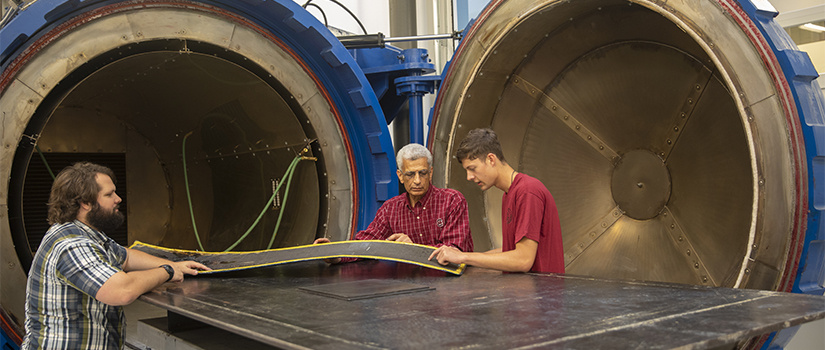Why Aerospace Engineering Graduate Study?
Graduate study in aerospace engineering affords the opportunity to enhance critical thinking and mathematical prowess, skills that are transferable to career advancement in research, design and application work environments. Plus, those with graduate degrees in aerospace engineering generally have a higher income than those with just an undergraduate engineering degree.
Programs of Study
Aerospace engineering graduate degrees include the Master of Engineering (M.E.), which is perceived to be more practically oriented, and the Master of Science (M.S.), which is considered more scholarly or fundamental and includes a thesis.
Programs of study for both the M.S. and M.E. in Aerospace Engineering include coursework in five core areas:
- Aeroelasticity
- Aerodynamics and Flight Mechanics
- Aerospace Structures
- Composite Materials
- Finite Element Analysis
Additional electives allow students to concentrate their studies in the mechanics, materials, and flight aspects of aerospace engineering.
Visit Graduate Handbooks and Curricula for additional detail.
Demonstrate your technical acumen and ratchet up your career objectives. This research-oriented graduate degree requires a thesis and 24 hours of graduate coursework.
Major components of the aerospace engineering M.S. program include:
- Research resulting in a thesis, thesis defense, and 6 hours of thesis credit
- A comprehensive exam
- 24 credit hours of graduate-level coursework in or related to aerospace engineering
- Not fewer than 12 credit hours taken at the 700-level or above
Our M.S. students will learn to communicate their research results through oral presentations and written publications. Consistent with this objective, M.S. students are required to submit, based on research performed while at UofSC, at least one conference paper (or abstract with presentation) or one journal paper prior to graduation.
Become a more-competent engineer with just 30 hours of graduate course work beyond your B.S. This non-thesis graduate degree is especially great for working engineers who cannot easily access a research laboratory.
Major components of the aerospace engineering M.E. program include:
- A comprehensive exam
- 30 credit hours of graduate-level coursework in or related to aerospace engineering
- Not fewer than 15 credit hours taken at the 700-level or above
Graduate-level business courses may be taken with advance approval by the student’s advisor and the graduate program committee.
Areas of Specialization
Course work and research can generally be conducted in any sub-discipline of aerospace engineering coinciding with the research interests of our faculty, which include the following topics:
Aerodynamics: Develop a sound understanding of the characteristics of low speed aerodynamics, transonic aerodynamics and supersonic aerodynamics. Learn to model incompressible inviscid, viscous and compressible flow. Apply your knowledge to aircraft aerodynamics, airfoil and wing theory and aerodynamic design.
Aerospace Materials and Structures: Study the characteristics of thin walled aerospace structures including mechanical and adhesive joints. Research manufacturing principles and technology, failure modes, and methods for testing and characterizing aerospace materials. Apply aeroelasticity principles to the design and analysis of aerospace structures.
Flight Mechanics: Analyze steady gliding, horizontal and climbing flight and turning performance using three dimensional equations of motion, coordinate systems, Euler angles and transformation matrices. Estimate airfield performance including take-off and landing events. Analyze cruise flight and transport performance in the presence of wind gradients.
Stability and Control: Develop an understanding of longitudinal, lateral and directional aircraft stability and control. Learn to derive and apply mathematical models that govern flight for various aerospace systems such as airplanes, helicopters and satellites.
Visit the Mechanical Engineering Department for more information on our faculty and research areas
Graduate Admissions
All applications must apply to the Graduate School at the University of South Carolina. The Graduate School provides helpful information on the admissions application process and even lets you know what to do before you apply.
Admission is competitive. Applicants are expected to have an earned baccalaureate degree in engineering or related field, with at least a B average.
Test Scores:
Minimum scores are generally a GRE-V of 150 and a GRE-Q of 155. Students whose native language is not English must submit a satisfactory score on an English proficiency test. The Accepted English proficiency tests include the TOEFL exam (minimum score of 80 on the internet-based test), IELTS International Academic Course Type 2 exam (minimum score of 6.5), and the PTE Academic (minimum score of 53).
